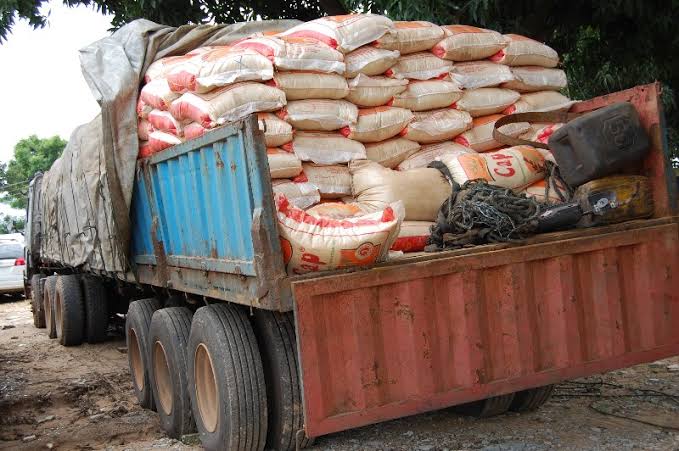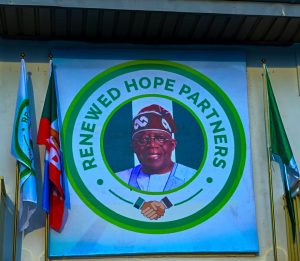News
Quarantine service begins clampdown on food smugglers, hoarders

By Francesca Hangeior
The Nigeria Agricultural Quarantine Service has commenced the clamped down on hoarders and smugglers of food items and other agricultural produce, as it announced the deployment of more officers to Nigeria’s land and sea borders.
It said the move was to support the Federal Government’s efforts to stabilise food prices nationwide and ensure food security in Nigeria.
“To support the Federal Government’s efforts to stabilise food prices and ensure food security, the NAQS has initiated a nationwide crackdown on the smuggling and hoarding of agricultural commodities,” the agency announced in a statement issued in Abuja.
It added, “The decisive action is part of the agency’s mandate to regulate the handling of agricultural products in Nigeria, ensuring they are safe for consumption and available at fair prices to the Nigerian populace.
“In line with the Renewed Hope Agenda of the current administration, we are fully committed to ensuring that Nigerians have more food on their table, by strengthening our borders and clamping down on the smuggling of hoarded agricultural commodities.”
NAQS, according to its Establishment Act 2017, was established to prevent the entry, establishment and spread of foreign pests and diseases of plant, animal and aquatic resources and products into the country.
The agency is to also promote sanitary and phytosanitary measures as it relates to the import and export of agricultural products, to minimise the risk to agriculture, food safety and the environment.
The agency in its statement on Monday, noted that “Food security is a paramount concern for the Nigerian government, and we are committed to ensuring that agricultural commodities are not smuggled out of the country through our ports and land borders.
“We believe that our efforts to clamp down on smuggling practices will not only help to stabilise food prices but also promote transparency and fairness in the agricultural supply chain.”
It stated that more officers of the agency had been deployed to the borders to tackle the menace of food smuggling and hoarding.
“To combat the illegal smuggling and hoarding of agricultural commodities, NAQS is enhancing its surveillance and control measures at all entry and exit points.
“Officers of the agency are working tirelessly across the country’s borders and control posts, conducting rigorous inspections, and monitoring to ensure no agro commodity is exported.
“This initiative reflects a comprehensive approach to tackling some of the recent challenges facing the agricultural sector and aims to ensure food security and promote sustainable development.”
The agency’s acting Comptroller-General, Dr Godwin Audu, urged the public to report any suspicious activities related to the hoarding or smuggling of agricultural commodities.
He said community participation and collaboration were vital for the success of this campaign.
The Federal Government has intensified efforts to stop the hoarding and smuggling of food outside Nigeria following the recent astronomical hike in the cost of food items nationwide.
It could be recalled that the Nigeria Customs Service had declared that it intercepted 15 trailers that were fully loaded with food items and were heading out of the country through the Sokoto State border.
It said the trailers were stopped and the food items were returned to Nigeria, adding that this was part of measures to stabilise the prices of food items across the country in line with the mandate of the Federal Government.
News
Osun PDP Reps Dismiss Defection Claims, Pledge Support for Adeleke

By Gloria Ikibah
Eight out of the nine Peoples Democratic Party (PDP) members representing Osun State in the House of Representatives have firmly restated their loyalty to the party and Governor Nurudeen Ademola Adeleke, distancing themselves from recent defection claims.
Their stance follows public comments by Rep. Busayo Oluwole Oke, who recently exited the PDP and hinted that other members of the Osun caucus were poised to follow his lead.
In a joint statement released in Abuja on Friday, the lawmakers which include Reps Bamidele Salam, Ajilesoro Abimbola Taofeek, Mudashiru Lukman Alani, Akanni Clement Ademola, Omirin Emmanuel Olusanya, Adewale Moruf Adebayo, Adetunji Abidemi Olusoji, and Oladebo Lanre Omoleye—made it clear they remain committed to the PDP and its leadership in the state.
They described Oke’s exit as unsurprising, pointing to what they called his long-standing pattern of defiance, public criticism of the party, and antagonism towards the Adeleke-led government.
The lawmakers labelled his defection as an act of ingratitude, given the political opportunities the PDP had afforded him over the years, and cautioned him against spreading misleading narratives aimed at courting favour within his new political camp.
News
Kalu Rallies South East to Embrace Centre for Greater National Gains

…as he unveils Renewed Hope Partners in Umuahia
…seek federal projects to boost regional economy
By Gloria Ikibah
Deputy Speaker of the House of Representatives,Rep. Benjamin Kalu, has urged the South East to forge stronger political alignment with the federal government, stressing that such synergy is key to unlocking greater development opportunities for the region.
Kalu made this call on Thursday in Umuahia, Abia State, during the formal launch of Renewed Hope Partners (RHP), a political and development-oriented platform tailored to advance the second-term ambition of President Bola Ahmed Tinubu.
Describing the RHP as a strategic tool, Kalu explained that it would serve to bridge national policies with regional priorities, ensuring that the South East fully benefits from the federal government’s agenda.
Speaking to a crowd of stakeholders and supporters, the Deputy Speaker, who represents Bende Federal Constituency, cited various achievements under the current administration, particularly in the South East, and reassured the people of the government’s continued commitment to infrastructure, economic inclusion, and stability.
He called on the federal government to prioritize key developmental projects in the region, including the construction of a gas pipeline to support industrial growth, the dredging of the Onitsha River to revive inland water transport and trade, and the expansion of the Onne port to ease logistics and boost economic activities across the South.
Kalu urged the region to leverage its collective strength and re-engage with the centre for long-term relevance and impact, noting that the time had come for strategic partnership over political isolation.

The Deputy Speaker highlighted several milestones recorded under President Tinubu’s administration, including proposed investments totalling $50.8 billion, a rise in national revenues to over ₦9.1 trillion within the first half of 2024, and a GDP growth rate pegged at 3.4% for the year.
He also pointed to a sharp rise in foreign remittances, which reportedly hit $23.4 billion—marking a 61.1% increase compared to the previous year.
Referencing the Compressed Natural Gas (CNG) initiative, Kalu noted that the shift is expected to reduce the country’s petrol import bill by over ₦2 trillion monthly.

News
Spanish police arrest mother over sale of newborn baby for $2,300

Spanish police said Friday they had nabbed a woman who allegedly sold her newborn baby girl to a couple undergoing fertility treatments for 2,000 euros ($2,300).
Officers arrested the 37-year-old last month in Mostoles, a southern suburb of Madrid, a police statement said. The couple suspected of buying the baby and two of their relatives were detained in the southern city of Cordoba.
A preliminary investigation concluded the woman “reached an economic deal” to give her newborn baby for 2,000 euros to the couple, but then “regretted selling her daughter” and asked to get her back.
The couple refused to return the baby unless the woman returned the money they had paid, plus another 1,000 euros to cover various expenses the woman said she had incurred during the month she spent with them in Cordoba before giving birth.
Police said they began investigating after the woman filed a complaint alleging that a family in Cordoba had “kidnapped” her newborn baby.
The baby was turned over to a child protection centre in Cordoba. The authorities had in 2022 removed the woman’s six other children from her custody, accusing her of neglect, police said.
-

 Economy13 hours ago
Economy13 hours agoMore Nigerians to experience poverty by 2027 – World Bank
-

 Politics13 hours ago
Politics13 hours agoLabour Party reaffirms Abure-led leadership after Supreme Court judgment
-

 News8 hours ago
News8 hours agoOborevwori /Okowa: PDP experiencing a rebirth and will soon bounce back-Saraki declares
-

 News13 hours ago
News13 hours agoGovernor Oborevwori’s Defection: A Masterstroke That Handcuffs Delta’s Opposition
-

 News5 hours ago
News5 hours ago2027: Pro-Fubara protesters want suspended Gov to run as Atiku’s VP(Video)
-

 News13 hours ago
News13 hours ago2027 done deal, more governors joining APC – Ganduje declares
-

 News6 hours ago
News6 hours agoEdo poll: How APC allegedly offered witnesses N30m bribe
-

 News13 hours ago
News13 hours ago2025 UTME begins at CBT centres nationwide






